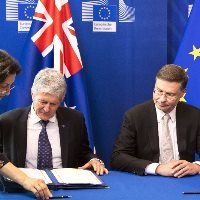(BRUSSELS) – The EU completed Monday the political procedures to ratify an ambitious free trade agreement with New Zealand, expected to cut some EUR 140 million a year in duties for EU companies.
The agreement, which still needs New Zealand to complete its own ratification, strengthens the EU’s engagement in what is seen as a strategically and economically important Indo-Pacific region.
Bilateral trade is expected as a result to grow by up to 30% within a decade, with EU exports growing by up to 4.5 billion annually. EU investment into New Zealand is expected to grow by up to 80%. This landmark agreement also includes unprecedented sustainability commitments, including respect of the Paris Climate Agreement and core labour rights.
The EU-New Zealand FTA will provide new opportunities for businesses by:
- Eliminating all tariffs on EU exports to New Zealand;
- Opening the New Zealand services market in key sectors such as financial services, telecommunications, maritime transport and delivery services;
- Ensuring non-discriminatory treatment to EU investors in New Zealand and vice versa;
- Improving access for EU companies to New Zealand government procurement contracts for goods, services, works and works concessions;
- Facilitating data flows, predictable and transparent rules for digital trade and a secure online environment for consumers;
- Preventing unjustified data localisation requirements and maintaining high standards of personal data protection;
- Helping small businesses export more through a dedicated chapter on small and medium enterprises;
- Significantly reducing compliance requirements and procedures to allow for quicker flow of goods;
- Significant commitments by New Zealand to protect and enforce intellectual property rights, aligned with EU standards.
On application of the agreement, EU farmers will from the off have much better opportunities to sell their produce in New Zealand. Tariffs will be eliminated as of day one on key EU exports such as pig meat, wine and sparkling wine, chocolate, sugar confectionary and biscuits.
EU farmers will see benefits beyond the tariff cuts. The FTA will protect the full list of EU wines and spirits (close to 2,000 names) such as Prosecco, Polish Vodka, Rioja, Champagne and Tokaji. In addition, 163 of the most renowned traditional EU products (Geographical Indications), such as Asiago, Feta, Comté or Queso Manchego cheeses, Istarski prut ham, Lübecker Marzipan, and Elia Kalamatas olives will be protected in New Zealand.
The agreement takes into account the interests of sensitive EU agricultural sectors, including a number of dairy products, beef and sheep meat, ethanol and sweetcorn. For these sectors, there will be no liberalisation of trade. Instead, the agreement will allow zero or lower tariff imports from New Zealand only in limited amounts (through so-called Tariff Rate Quotas).
The EU-New Zealand FTA is first to integrate the EU’s new approach to trade and sustainable development (TSD), with both sides agreeing ambitious TSD commitments covering a wide range of issues, based on cooperation and stronger enforcement. For the first time in an EU free trade agreement, the deal has a dedicated sustainable food systems chapter, a dedicated trade and gender equality article, and a specific provision on trade and fossil fuel subsidies reform. The deal also liberalises environmental goods and services at entry into force.



